Talks Underway To Normalize Ties Between Riyadh, Jerusalem: Media
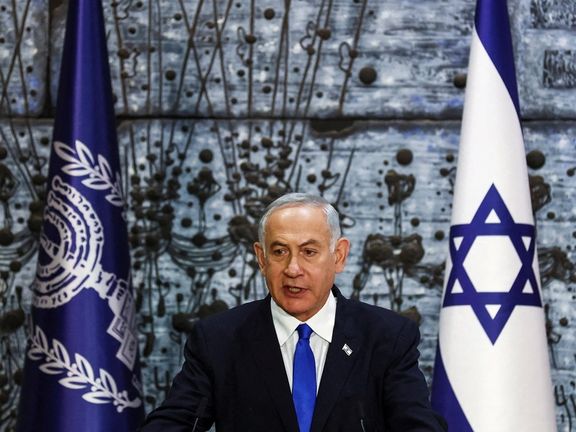
The Israeli media have reported that negotiations between Israel, the United States and Saudi Arabia to normalize ties between Jerusalem and Riyadh are underway.

The Israeli media have reported that negotiations between Israel, the United States and Saudi Arabia to normalize ties between Jerusalem and Riyadh are underway.
The Hebrew daily Yediot Aharonot said over the weekend that talks were underway between Israel, the United States and Saudi Arabia with respect to a normalization deal between the Jewish state and the most important Persian Gulf Arab country.
Such an agreement would make Saudi Arabia the fifth Arab state to normalize ties with Israel under the 2020 Abraham Accords.
The UAE, Bahrain, Morocco, and Sudan normalized ties with Israel in exchange for its suspension of plans to annex West Bank settlements. Netanyahu would similarly suspend plans for annexation in exchange for a Saudi deal as well, Yediot Ahronot said.
In an interview with Jewish Insider Friday the Israeli Prime Minister said, “I hope to bring about a full, formal peace as we’ve done with the other Gulf states like Bahrain and the United Arab Emirates.”
He further noted that “It’s up to the Saudi leadership to decide that. I hope they will. And I intend to explore that alongside my other main goals. This is a very important goal, because if we have peace with Saudi Arabia, we are effectively going to bring an end to the Arab-Israeli conflict.”
The so-called Abraham Accords, implemented by Benjamin Netanyahu during the Donald Trump administration in 2020, brought peace between Israel and the United Arab Emirates, Bahrain, Morocco and Sudan.
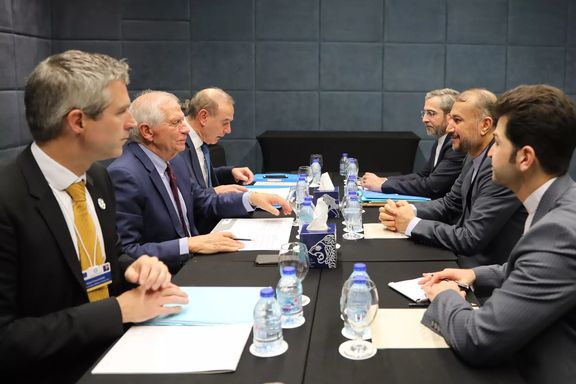
Debates on Iran's unsuccessful foreign policy and the Raisi administration's obvious weakness in this area have come into the spotlight in Iranian media.
The debate began following Foreign Minister Hossein Amir Abdollahian and chief nuclear negotiator Ali Bagheri's reportedly unsuccessful meeting with EU foreign policy chief Josep Borrell in Amman.
Iranian academic Pirouz Mojtahedzadeh said in an interview with Didban Iranwebsite that "Iran's foreign policy is bankrupt." He charged that Iran's diplomats are not well experienced and well trained, adding that Tehran's foreign policy is ideological. He also charged that IRGC generals are the wrong people in the foreign relations arena.
Elsewhere in the interview Mojtahedzadeh argued that the foreign ministry should have a technical rather than ideological approach to foreign policy, adding that Iran needs skilled diplomats who can at least speak English. He said Iranian diplomats should confront their international counterparts, even US diplomats based on the country's national interests rather than any ideology.
Meanwhile, criticizing Tehran's foreign policy priorities which is evident from its attempts to get closer to Moscow and Beijing. He lashed out at China for "its double-standards in the region" and said "Russia will also let us down."

Career diplomats such as Ahmad Azizi have also expressed disappointment over the performance of the foreign minister and his team. Azizi, a former deputy foreign minister, ambassador to Germany and the broker of the deal with the United States over releasing US diplomats who were taken hostage in Iran following the 1979 seizure of the US embassy in Tehran, wrote in a letter to Kamal Kharrazi, the head of Khamenei's Foreign Relations Council that "The foreign minister cannot do anything. Please think of a solution yourself."
Azizi said in the letter that "the chronic and painful crisis of sanctions needs an urgent solution." Meanwhile, he stressed: "The problem is that we have never thought of any problem as a crisis!" He reiterated that solving many of Iran's problems,” including the current economic pressure on the people, “depend on tackling the crisis of sanctions."
According to the letter, published as an op-ed in the reformist daily Etemad, "The routes to decision making in Iran are closed in the Iranian political system which is facing a catalogue of crises. "
As a result of these crises, Iranians' shopping baskets have become increasingly smaller while there is no solution in sight for the problems of industries and entrepreneurship including rising unemployment figures and the government's indecision about the future of the young generation.
The biggest hurdle is opposition by Iran's hardliners to reviving the 2015 nuclear deal based on their ideological, anti-US stance. On Thursday, Hossein Shariatmadari the editor of Khamenei-funded ultraconservative Kayhan newspaper lashed out at Iranian negotiators and diplomats for expressing readiness for a deal with the West during the meeting in Amman.
He wrote: "Why did you say you were ready for negotiations over the JCPOA while Europe and the United States are insisting on their support for Iranian rioters [protesters]?" Other Iranian media including Didban have said that Shariatmadari's opposition to renewed negotiations reveals that a key part of the Iranian government opposes the revival of the talks.
Shariatmadari's connection to Khamenei, once again point fingers at the Supreme Leader as the main obstacle to a deal that could save ordinary Iranians from a long-standing financial misery.
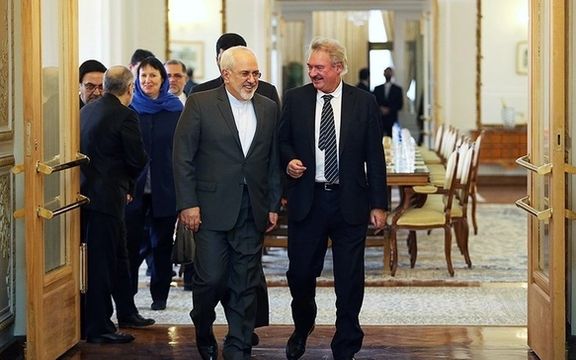
Luxembourg’s Foreign Ministry says a resident of the country of Iranian descent has been arrested in the Islamic Republic and sentenced to death.
Foreign Minister Jean Asselborn spoke on the phone with his Iranian counterpart Hossein Amir- Abdollahian to discuss the case and speak about the situation in the country.
According to the statement from the Luxembourg Foreign Office, Minister Asselborn supports the efforts of the EU and member countries to stand up for the rights of Iranian demonstrators. Luxembourg opposes the death penalty without exception, calling it a cruel and inhuman punishment.
In the readout of the conversation issued by the Islamic Republic, there is no mention of the Luxembourger who faces execution. The Iranian foreign minister only said that he voiced Tehran’s willingness for closer relations with Luxembourg in various fields.
Protests have been raging in Iran for over three months with people seeking the fall of the clerical regime. The Islamic Republic has been cracking down on protesters while blaming foreign countries for the unrest.
On September 30, Iran’s Intelligence Ministry announced the detention of at least nine non-Iranian citizens from Germany, Poland, Italy, France, the Netherlands and Sweden. On October 20, Fars New Agency, which is affiliated with the Revolutionary Guard, said “citizens of 14 countries, including the United States, Russia, Austria, France, the United Kingdom, and Afghanistan, have been arrested in recent riots in Iran.”
The Regime has sentenced dozens of protesters to death and has hanged two of them so far with many more facing imminent execution.
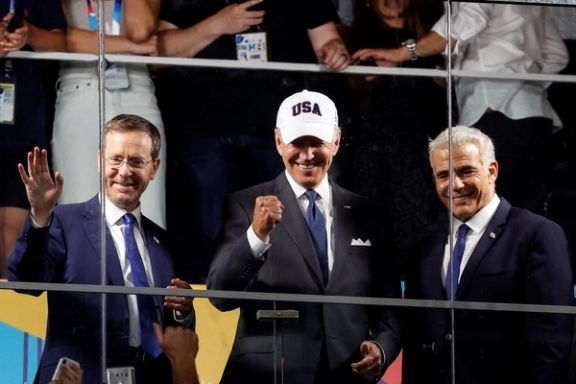
US Secretary of State Antony Biden said Friday the administration of President Joe Biden had concentrated on “rebuilding and revitalizing America’s alliances.”
Speaking at a press briefing, Blinken said the US was working alongside “the many countries that share our fundamental interests and values.” In the Middle East he cited Saudi Arabia, Egypt, Bahrain, Morocco, and Israel. Blinken extended “congratulations to Prime Minister [Benjamin] Netanyahu on announcing the formation of a new government.”
Netanyahu's relations with the Biden Administration was not as close as his friendship with former President Donald Trump and tension with Palestinians could spike because of the influence of religious parties in his government.
“Nato has never been stronger or more united,” Blinken said. “We doubled the number of battlegroups along Nato’s eastern flank…the Russian war machine is in dire straits.”
Both Iran and Russia, Blinken said, shunned diplomatic solutions. “We have to see some meaningful evidence that Russia is prepared to actually negotiate and negotiate,” he said.
Blinken acknowledged Iran had abided by its commitments under the 2015 Iran nuclear agreement, the JCPOA (Joint Comprehensive Plan of Action), until the US in 2018 left the JCPOA. But he attributed the failure of talks aimed at reviving the JCPOA solely to Iran not being “willing or able to do what’s necessary.”
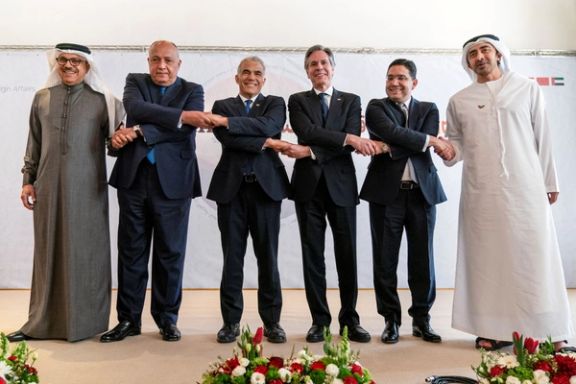
With growing talk in Washington and Tel Aviv of a ‘military option’ against Iran, Blinken noted the challenges the US faced in downsizing its Middle Eastern military presence.
Marginal events, significant developments
David Barnea, head of Mossad, at the Israel’s intelligence agency awards Thursday, attacked the 2015 Iran nuclear agreement as “absurd” and looked forward to a government in Tehran that was as close to Israel as was the Pahlavi Shah before the 1979 Revolution.
A review of “significant regional developments…including the current situation in Iran” was the center of Friday’s virtual meeting between US National Security Advisor Jake Sullivan with Israeli National Security Advisor Eyal Hulata, according to a White House statement. Given their “shared commitment to countering Iran’s threats to the region,” the officials “discussed the broad array of economic sanctions imposed in recent months against Iran” and “reviewed ongoing cooperation and exercises between the US military and Israel Defense Forces.”
Gabi Portnoy, an Israeli cybersecurity official, dismissed as a “marginal event” the hacking of Israeli security footage of a bombing in Jerusalem November – attributed to an Iranian hacktivist group ‘Moses Staff.’ In remarks reported by the Times of Israel Friday, Portnoy said Israel security agencies “didn’t do the minimum required.”
Artificial intelligence, unmanned vessels
In a press briefing Thursday, General Michael Kurilla, Commander of the US Central Command - which covers the Middle East and which has included Israel for a year – said adversaries would be combatted both by “values-based relationships” and the military use of artificial intelligence, including “unmanned systems...[like 100 naval] surface vessels and undersea vessels.”
The US had a “very strong military-to-military relationship” with Saudi Arabia, Kurilla said, exemplified by his discussion that morning with General Fayyad Al-Ruwaili, the Saudi chief of staff. Egypt, Kurilla noted, had a “large, modern, and powerful military” due in part to US training and equipping over 30 years.
“We’ve got to cultivate deep, abiding partnerships that can serve as a hedge against threats in the region while deterring Iran from its worst, most destructive behavior,” the CENTCOM commander said, as Tehran continued “to violate [US] sanctions,” and to “undermine regional security and stability through militia groups, ballistic missile capabilities, UAVs [unmanned aerial vehicles, or drones], and routine threats to international waterway.”
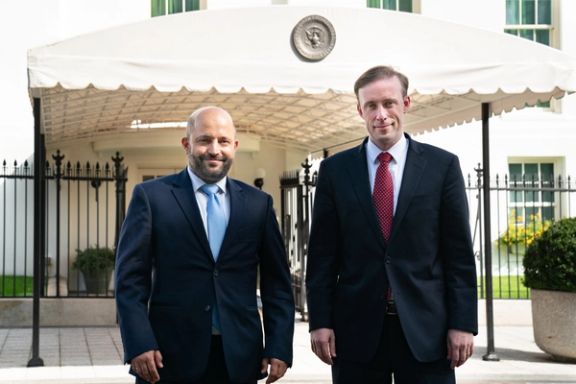
US National Security Advisor Jake Sullivan and his Israeli counterpart Eyal Hulata held a discussion Thursday over Islamic Republic growing’s military cooperation with Russia.
Senior representatives from foreign policy, defense, and intelligence agencies also took part in the virtual meeting of the US-Israel Strategic Consultative Group (SCG). The national security chiefs and their aides reviewed Islamic Republic’s growing military relationship with Russia, including the transfer of weapons the Kremlin is deploying against Ukraine, targeting its civilian infrastructure, and Russia’s provision of military technology to Iran in return.
The officials also expressed commitment to countering Iran’s threats in the region, and to ensuring that Tehran can never acquire a nuclear weapon.
According to a read out of the meeting released by the White House, they also discussed the broad array of economic sanctions imposed in recent months against Iran, reviewed ongoing cooperation and exercises between the US military and Israel Defense Forces, and assessed means for enhancing Israel’s security and economic integration throughout the Middle East region.
British defense minister Ben Wallace also said on Tuesday that Russia was planning to give Iran advanced military components in exchange for hundreds of drones. "Iran has become one of Russia's top military backers," Wallace said.
The West is particularly concerned over the possibility of Iran supplying missiles to Russia, as Moscow’s stockpiles dwindle.
Russian Energy Minister Nikolai Shulginov said in a statement on Tuesday that Russian companies are interested in cooperating with Iran on gas turbine technology and joint production. Russia has been trying to start producing its own gas turbines of medium or large capacity for years, but is yet to fine tune the process.
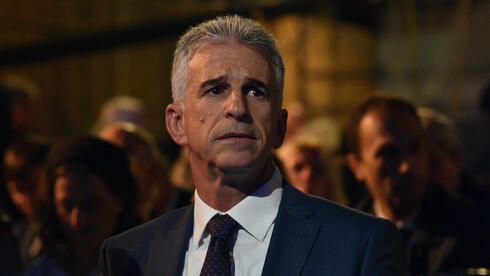
Iran is preparing more weapons deliveries to Russia and is trying to mislead the world on arming its ally, head of Israel’s Mossad, David Barnea said Thursday.
In a speech to his agency’s employees, Barnea warned about Tehran’s intentions, underlining that the Islamic Republic continues daily cyber-attacks and other machinations against Israel. He added that Mossad is ““still warning about Iran’s future and intentions, which it is trying to keep secret.”
The spy chief also called the Obama-era nuclear deal with Iran known as the JCPOA an “absurd” agreement taking aim at the United States and its European allies who have been negotiating with Tehran to revive the accord since early 2021.
The diplomatic effort has come to an impasse as Iran is ramping up uranium enrichment but the Biden Administration and the European Union still say that diplomacy is the best option to limit Iran’s nuclear program.
“We are warning about Iran’s intention to expand its uranium enrichment program, and its intention to increase its influence over friendly Muslim countries in the region in various ways,” he said, vowing never to allow the Iran’s clerical regime to obtain nuclear weapons.
He also praised the Iranian protest movement, saying hundreds have been killed in the streets, calling it “unrestrained brutality” by regime forces.
Barnea claimed that Israel provided intelligence to its Western allies earlier in the year about Iran’s plans to provide killer drones to Russia to be used against Ukraine and insisted that Tehran is preparing more weapons deliveries to Moscow.